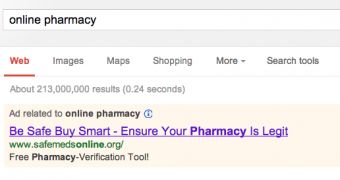Google is once again under fire over links to rogue pharmacies, a problem in the US. Rogue pharmacies in this case may be pharmacies that sell prescription drugs without a prescription or legitimate pharmacies from Canada for example, which ship to the US.
The company had to pay a hefty $500 million (€378 million) fine over ads to these rogue pharmacies a few years ago. Since then, it's been a lot more careful about them. In fact, it says, it blocked some three million ads suspected of being linked to this type of sites in the past two years alone.
The company is highlighting some of its efforts in fighting these types of ads, boasting for example that, according to independent studies, the number of ads like these has dropped by 99.9 percent since 2010.
But Google didn't randomly feel the urge to talk about this. It’s talking about it because it is now, again, the target of "investigations" by state attorneys general over the matter.
This time around, they aren't arguing that Google is selling ads for these pharmacies, but that it's showing links to them in the search results and sometimes suggesting queries related to them.
This, the grandstanding attorneys believe, is a great evil by Google and the company "should do something" to prevent this, presumably "for the children."
Press release-investigations like these aren't a new phenomenon, as state attorneys general regularly find something, some site, that they can band together against and badger into submission, even if the site isn't doing anything illegal, so they can score some political points.
This is why Google is addressing the issue of search results as well by reiterating its usual and known stance, that it does not mess with search results except in very narrow and clearly defined cases or when it's ordered to do so by a court.
As such, the search giant won't voluntarily remove these sites from search results and doesn't believe it should.
However, the company is tackling the issue of autocomplete. While the feature is algorithm-driven, i.e. the predictions are based on what people search for, Google does sometimes make adjustments to it, removing offensive or sensitive terms. It's now looking into how to best do this with rogue pharmas as well.

 14 DAY TRIAL //
14 DAY TRIAL //